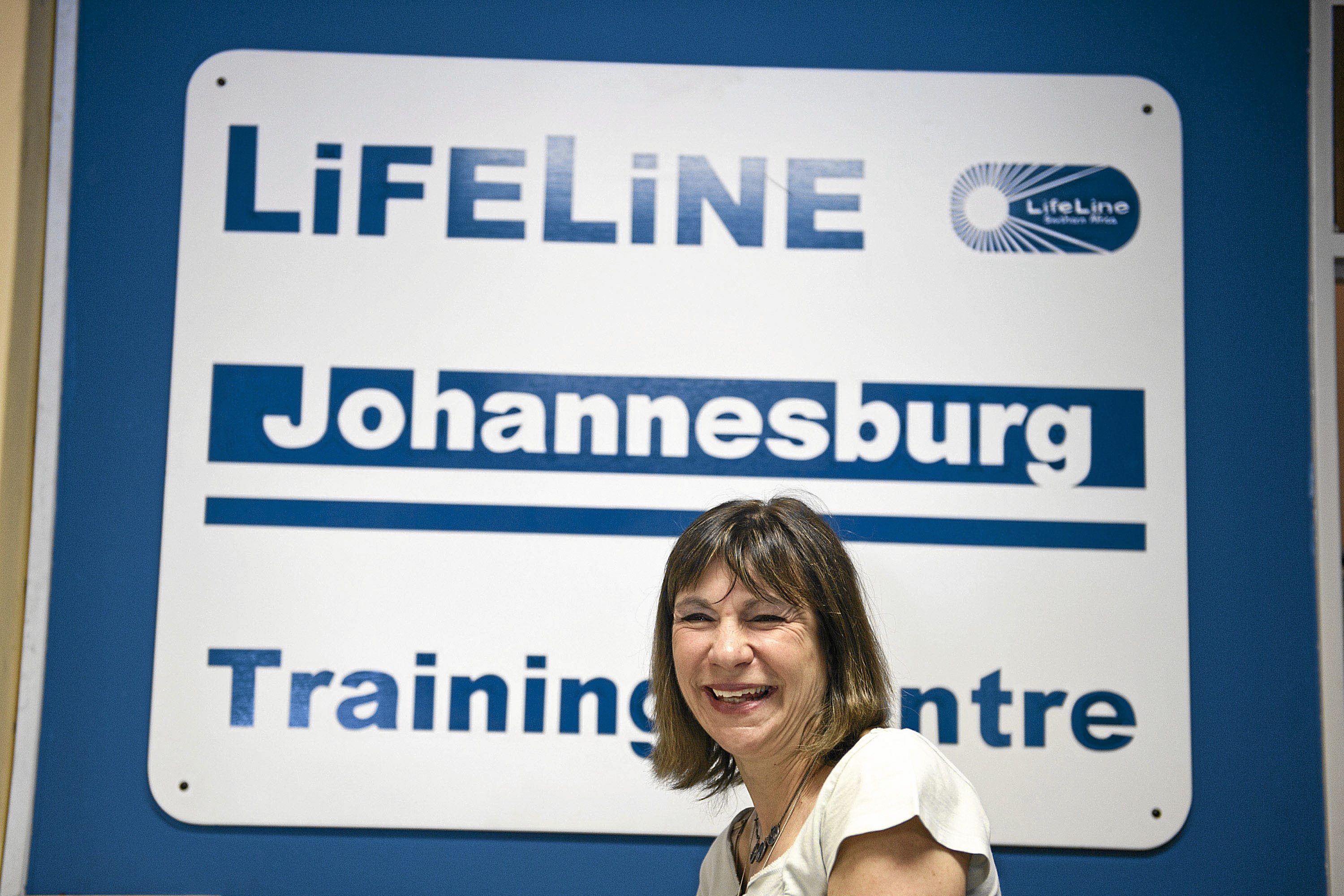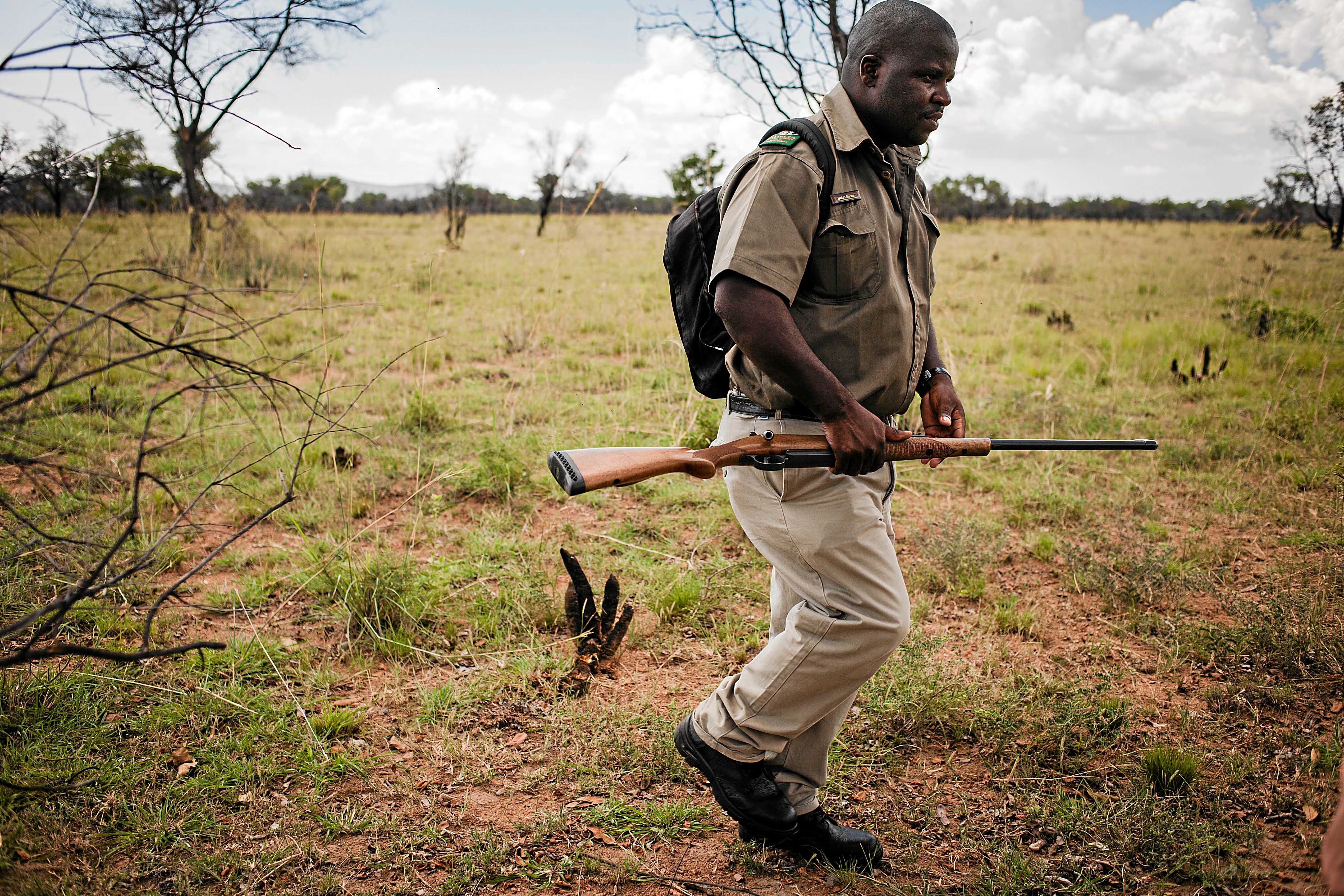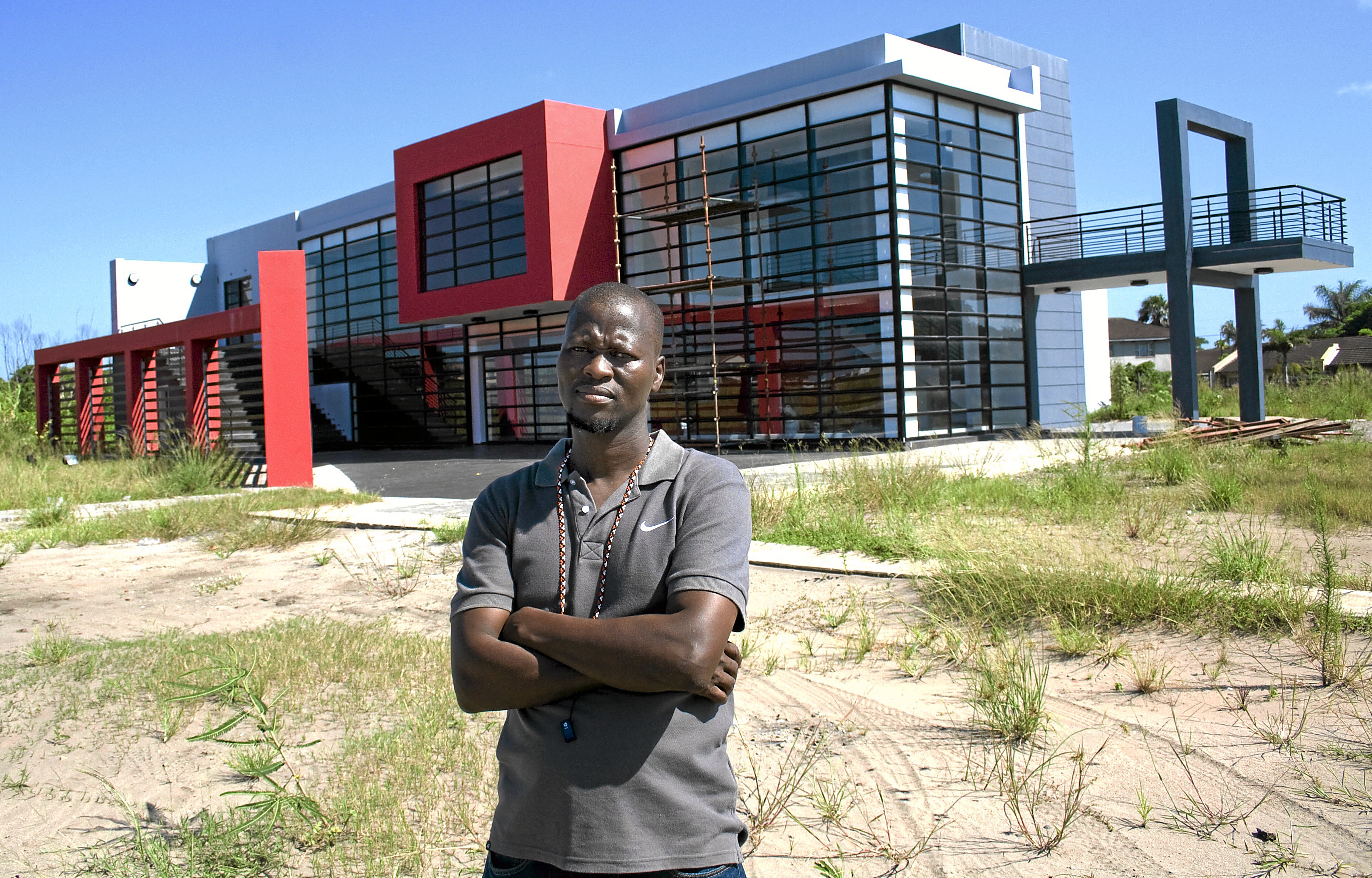Solly Ratladi (age unknown), Unemployed
Amid the bustle of the late-afternoon traffic cutting through the leafy Johannesburg suburb of Saxonwold, Solly Ratladi can be found perched on the edge of the same garden-bed wall every day. He grins and waves to cars that slow down and hoot, and to joggers who greet him by name as they pass.
Parked next to him on the pavement is a shrine-like trolley that he pushes everywhere. It is decorated in a kaleidoscopic display of old CDs. Like the figurehead at the prow of a ship, a plastic doll with wide, staring eyes is attached to the front of the trolley.
It is through the goodwill and hand-outs of the neighbourhood residents that he survives. "I don't want anything," he says. "The people give me food and clothes."
Everybody knows Uncle Solly with his old-world charm, his tall, thin and slightly bent frame and easy smile. He doesn't drink, he declares, and his only vice, betrayed by a hoarse throaty voice, is BB tobacco. He sleeps free of charge on a sponge mattress in the garage of a house just off Oxford Road.
The only official "interest" in his plight was shown by the metro police. They confiscated four of his trolleys. His fifth one was left alone after the suburbanites
protested. "The white people, they complained: 'Why do you take madala's [the old man's] trolley? He doesn't steal, he just walks in the street and the people give him something'."
Despite existing on the margins of Johannesburg, Ratladi has a long-standing connection to the city. He prefers conversing in Afrikaans, explaining that in Johannesburg, "Afrikaans came first, English he come now now. Before if you went to the shops and said you want bread the people won't understand you. Now the schools all teach English. English makes me dom [stupid]."
Migrant labourer Ratladi, who worked as a gardener, was a resident of the fabled multiracial Sophiatown in the 1950s before he was forced to move to Alexandra township. His children, who now have children of their own, have always lived in his hometown of Makhado in Limpopo, which he still knows by its former name of Louis Trichardt. He returns at Christmas time and in the winter months of June, July and August.
The only indication he has of his age is that in 1956, when he first arrived in Johannesburg, he was young, but not a "very young man". He doesn't know his date of birth –his ID was stolen by street thugs who are the one bane of his life.
The depravity and violent tendencies of the klein laaities (youngsters) highlight for him the failures of democracy. "That time there was no crime. Before if you said my children don't have food, the government would understand. Now there's no work, the government can't do anything and the people steal too much," he says.
Ratladi has had no schooling. What he knows of politics he has gleaned from street talk. "I see and I hear what people are talking about and then I know what is going to happen," he says.
But now, as in the days of apartheid, he avoids politicking. "To join is too heavy," he says. "You cannot talk straight. You will get killed."
And then at sundown he wheels his trolley to the garage where he locks the door behind him and retires for the night. – Faeeza Ballim
Mickie Jacobs (59), Trauma counsellor 
LifeLine trauma counsellor Mickie Jacobs has been volunteering at counselling centres for as long as she can remember.
Born in the United Kingdom, she moved to South Africa in 2001 with her family. A few years later, she completed her training with LifeLine in Johannesburg.
"Counsellors are highly trained volunteers, so none of us is paid," says Jacobs. "As such, we are not really 'professionals'."
Her counselling is offered to people who have had various traumatic experiences but Jacobs says, "a big chunk in a broad sense is relationships and the abuse experienced with them; physically, emotionally, sexually and financially. And yes, trauma is widely crime-related too." A big part of being a counsellor is having the ability to separate your work from your personal life. "I like to do different things when I get home – watch a movie, go out for supper and in the mornings I exercise."
Her most emotional work experience was with a young woman who became HIV positive through her boyfriend. "It was immensely sad to see such a young woman who was trapped in a belief that she was going to die because of this betrayal by someone close to her. At the end, it is only that person who can decide to change that belief. All I can do is help to get her through it," she says. South Africa is "a traumatised society. Our trauma is so much broader
than many other countries in the world today," says Jacobs. "I get immensely angry and immensely sad at the lack of protection we have in South Africa. Police officers are not trained to deal with rape and domestic abuse cases.
"When they don't help that person in the way that they should, the victim experiences increased trauma. People need support. They just want someone to listen to them and understand what they are saying."
Jacobs says she has to put her personal feelings aside and focuses on her clients and how to help them. "Despite all this, I think all this anger and sadness is what strengthens the drive for me to be here and come back to help more people."
Jacobs says: "South Africans need to start believing more in themselves and in this country. I would like to see the education system improve and people to understand that education is where it all starts. Crime must also drastically be brought down because South Africa has so much to offer. It is truly a beautiful country." – Aneesa Fazel
Isaiah Banda (35), Game ranger

Isaiah Banda squats on his haunches and sifts some pale Limpopo sand between his fingertips, watching the way the dirt falls out of his hand. "It's alright, we can move forward," he says. "We are downwind."
Ahead, a rhino grazes near her calf in the tall, yellowed grass of the lowveld. We edge forward slowly, each step crackling in the undergrowth. Eventually, we can hear the slow chomp of mother and child. Banda watches with the quiet respect of one who knows the bush. After a few minutes, the yip of a wildebeest pierces the air. "We need to move off," he says. In his hands, he holds a rifle. He is determined not to use it.
Later, Banda stands on a clipped green lawn at the lodge. "I think people now have more opportunities than they did before," he says. He began his working life as a gardener. But his heart was in the bush, a passion ignited in his earliest days growing up on a game farm where his father worked as a labourer.
However, when Banda priced a two-week game-ranging course at Limpopo Field Guiding Academy his heart sank. The cost was R8 000. "I told them I wanted to do the course and I started paying them towards it. I gave R50 one week, maybe R150 another week, and so on." Eventually, the academy's general manager told Banda he could go on the course without paying any more. And so began a new life.
After qualifying in 2006, he was placed at Mabula game reserve as a trainee game ranger. He has been promoted four times and was recognised as the Limpopo game ranger of the year for 2010-2011 by the Limpopo tourism department. As the wildlife service manager, he manages 25 other rangers and oversees the lodge at night.
But it hasn't all been smooth sailing. Banda has had to study, scrimp and sacrifice to comply with the strict regulations of the game ranging industry.
Despite all their qualifications, game rangers' salaries start at R2 500 a month and trainees earn even less. But, says Banda, an experienced game ranger with good qualifications can earn between R8 000 and R10 000 a month.
He believes that the benefits make up for the modest salary. Banda eats all his meals with the guests, has free on-site accommodation, has a provident fund that is paid for by the lodge and half his medical aid costs are covered.
The lodge also covers all training costs and assessments, as long as he keeps passing his tests. Banda and his partner, Flora Mosima (26), make enough to take care of their four children.
"A lot of people cry, but to be honest, it's better in South Africa than a lot of other countries," says Banda. He is currently working towards his Field Guides Association of South Africa Level 2 qualification and is studying conservation.
Although Banda has already "reached 90% of [his] dreams", he has one more great aim. He hopes eventually to manage a game lodge. "It might not be now. But if you believe, if you keep on dreaming, you'll get there one day," he says. – Thalia Holmes
Bhekani Thabede(39), Writer and arts developer
A Zululand man who has not been afraid to take advantage of the government's initiatives and design his own future believes that Jacob Zuma's ascendency to power has elevated the region's prospects.
Writer and arts developer Bhekani Thabede fits the bill of the new middle-class black South African. He works hard, has used his opportunities and continually looks for new ones.
Thabede was born in the deep rural areas near Pongola in Northern KwaZulu-Natal and now lives in Richards Bay suburbia with his wife.
He founded and runs Zululand's only dedicated arts development hub, the Khula Arts Centre. The arts development hub services the uThungulu district, which covers the municipalities of uMhlathuze, uMlalazi, Ntambanana, Mbonambi, Nkandla and Mthonjaneni. It focuses on music, dance, theatre and visual arts and provides exhibition space for the region's artists.
The centre relies on government assistance, private donors and its own revenue-generating programmes, which include music, singing, acting, painting and sign-language lessons. Thabede spends a large part of his time sourcing funds, developing programmes for donors and finding the right people to drive the courses.
"Before 2009, people were sceptical of this province and this region. People would immediately think this area was rife with political violence and that everyone and everything was about the Inkatha Freedom Party. There is no question that, now that there is an ANC president who comes from this region, people view this province as politically diverse and stable. This in turn has meant greater opportunities for the area and those who live and work here," said Thabede.
From 1994 to 2004 he served in the South African National Defence Force, rising to the rank of corporal. He was predominantly stationed in areas where there was faction fighting between the ANC and IFP. The year he left the army, he was accepted into an arts programme run by the KwaZulu-Natal department of arts and culture, and accredited by the sector education and training authority.
By 2007 Thabede had started the centre, a non-profit organisation, through continuous lobbying of the arts and culture department, which committed to support the project for three years. Four years later, he convinced the department to commit to and build the R6-million state-of-the-art building for the centre. A second phase is already in the planning.
Thabede's drive is reflected in his achievements. He won the 2005 Sithengi Film Festival award in Cape Town for best script for The Working Day and received financing from the National Film and Video Foundation to develop the script.
In 2011, he published the book Sweat and Blood for Liberation, which was financed by the National Heritage Council. It documents Zululand's unsung heroes of the liberation struggle.
Most recently, he was hired as a researcher for a documentary on the now late struggle stalwart Amina Cachalia.
"We [as a country] have come a long way since 1994 but the lives of many people who live in the deep rural areas are no different. Although the government has great programmes and policies, it is the implementation thereof and lack of grassroots access that are problematic. It seems the state is more concerned about getting the numbers than the actual sustainability of a project. We need to create entrepreneurs and job creators," said Bhekani.
His latest project is a newspaper called Youth Mate, which focuses on young people, and he has convinced the Media Development and Diversity Agency to fund a feasibility study for it because he believes it is important for young people to express their views.
"We must be cautious not to stifle debate through fear. If we live in a democratic country we must allow our people to express themselves. We must promote Steve Biko's ideals of 'I write what I like'. We cannot control thought." – Jonathan Erasmus